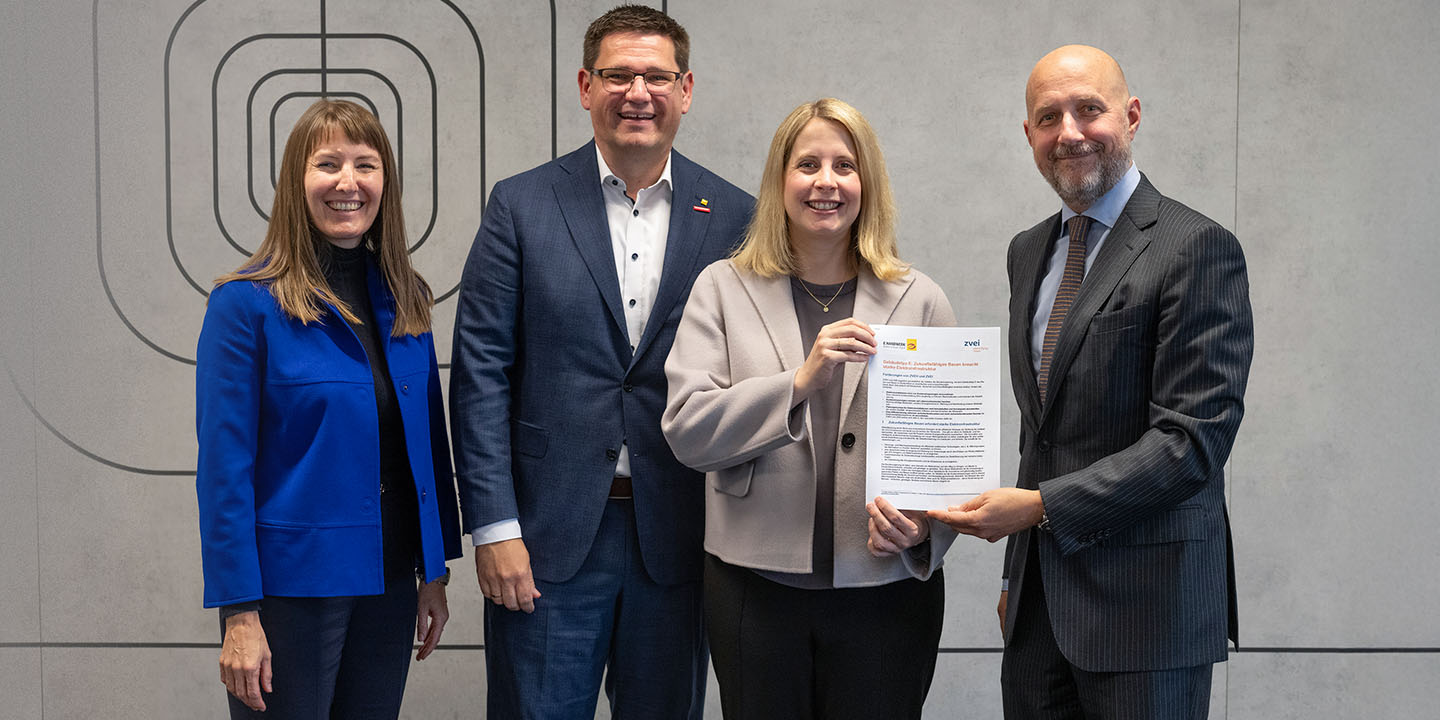October 31, 2025
Future-proof building requires a solid electrical infrastructure
Hager Group, ZVEI and ZVEH discuss Building Type E with Federal Minister for Building Verena Hubertz.
How can we create the right framework for housing that is both affordable and climate-friendly? This question was at the center of discussions between Verena Hubertz, Federal Minister for Building, Anke Rehlinger, Minister President of Saarland, Esra Limbacher, Member of the German Bundestag, Daniel Hager, Chairman of the ZVEI Platform Building and Chairman of the Supervisory Board of Hager Group, Stefan Ehinger, President of ZVEH, and Sabine Busse, CEO of Hager Group, at the company’s headquarters in Blieskastel.
A new planning approach for simple and efficient construction
To simplify planning processes, shorten construction times and reduce costs, industry, skilled trades and policymakers aim to jointly advance “Building Type E”. This new planning approach is designed to streamline building regulations and comfort standards for architects and developers – enabling affordable and future-ready housing.
Verena Hubertz, Federal Minister for Housing, Urban Development and Building :
“The Building Type E stands for new ways of thinking and doing – and for moving away from unnecessary complexity. It gives planners and engineers the flexibility to deviate from costly but non-essential standards. Electrical installations will play a key role in this. We depend on innovative approaches to establish affordable and sustainable solutions for construction and housing in the market of tomorrow. Together with the Federal Ministry of Justice, we are currently working on the legal framework. A law alone does not bring change – that’s why, with Building Type E, we rely heavily on the expertise and active involvement of those who plan and build.”
Minister-President Anke Rehlinger: ‘Building must become easier and more affordable again. With companies such as Hager, Saarland has innovative partners for the present and future of construction. Rapid contact between experts from politics and business helps to keep goals and practice in harmony with each other.’
“Building Type E" must combine quality, standardization and future readiness. It provides a solid foundation for achieving ambitious climate targets in the building sector. Affordable and climate-friendly construction can go hand in hand,” said Daniel Hager, Chairman of the ZVEI Platform Building.
“A future-proof electrical infrastructure is the backbone of modern buildings. Electrification and digitalization are the key to the future of construction,” emphasized Sabine Busse, CEO of Hager Group, during the meeting.
Electrification – a prerequisite for climate goals
Electrification of buildings is crucial to achieving climate targets in the construction sector. For Building Type E to reach its full potential, electrical installations must be understood as a fundamental prerequisite for decarbonization.
“Only if buildings are properly electrified and connected from the start, can they contribute effectively to the energy transition. Cost savings must not come at the expense of future viability. The focus must be on life cycle costs, such as energy consumption, maintenance and retrofitting, and not exclusively on short-term construction costs,” said Daniel Hager.
Stefan Ehinger, President of the Central Association of German Electrical and Information Technology Trades (ZVEH), added:
“The electrical trades want construction to become more cost-effective and less bureaucratic. To achieve that, we need standards. They provide guidance and legal certainty. Innovation and customized features in electrical engineering also need to be standardized. Standardization bodies and associations should therefore develop politically accepted performance frameworks that offer orientation and support faster planning.”
A long-term perspective instead of short-term cost debates
ZVEI and ZVEH jointly call for a shift in perspective:
The focus must move away from short-term construction costs toward long-term energy and operating costs.
A reduced initial configuration of electrical installations leads to higher retrofitting costs and slows down the necessary transformation of the building sector.
Planning standards are a guarantee of safety, quality and efficiency – and they provide the necessary legal certainty for all stakeholders involved.
Visit to Blieskastel: Politics meets industry
Following the expert discussions, Federal Minister Verena Hubertz, Minister President Anke Rehlinger and the delegation from politics and associations visited Hager Group’s production facilities.
During a guided tour, they gained insights into how the company’s innovative solutions in energy management, charging infrastructure and building automation are helping to turn the energy transition into reality.
-
About Advizeo
Hager Group is a leading provider of solutions and services for electrotechnical installations in residential, commercial and industrial buildings with 13,000 employees generating 3 billion Euros in sales.
Components and solutions are produced at 23 locations around the globe and are distributed to customers in more than 100 countries. Hager Group is an international independent family-owned company headquartered in Germany.
Being one of the industry’s innovation leaders, Hager Group aims at sustainably shaping the electrical world of tomorrow and play a leading role in the field of energy management and distribution. Customers rely on the group’s safe and simple products and solutions which range from energy distribution, cable management and wiring accessories to building automation and energy management under the brands Hager, E3/DC, Berker, Elcom, Bocchiotti / Iboco, Pmflex Eficia and Advizeo.










